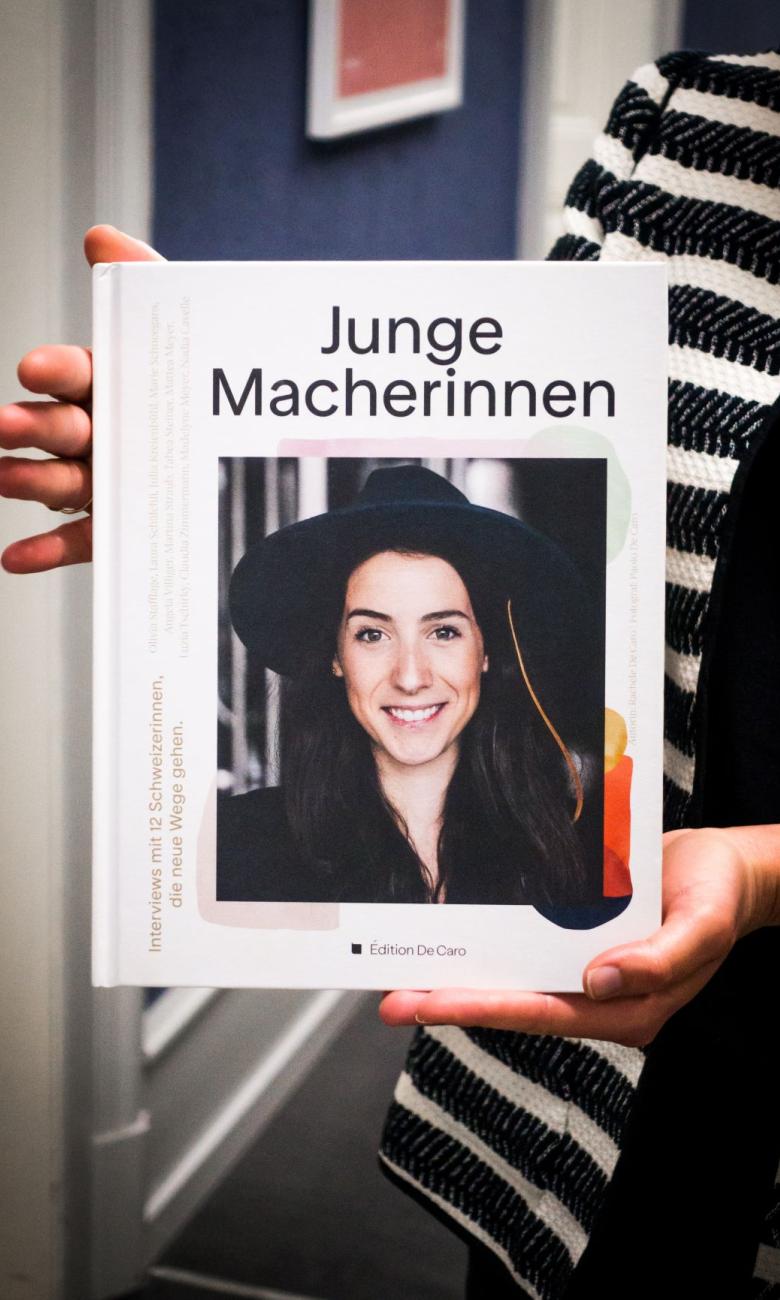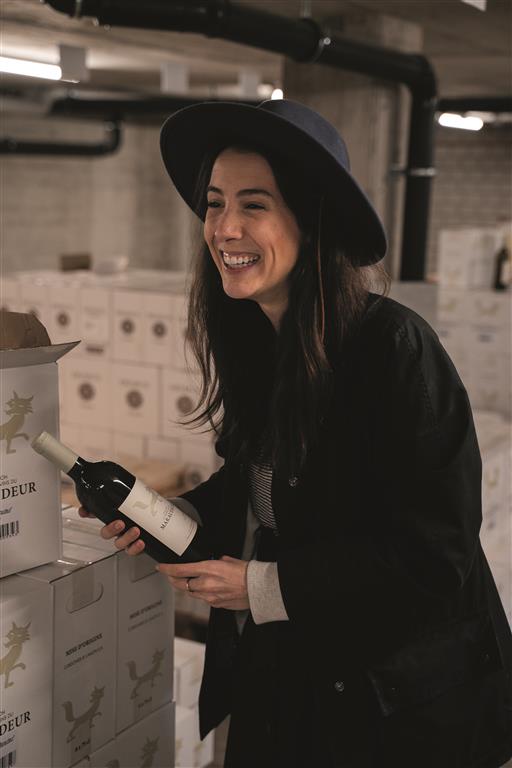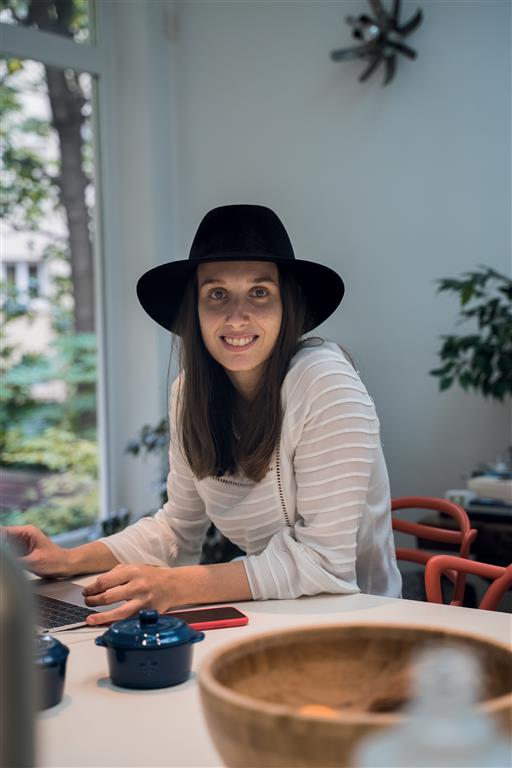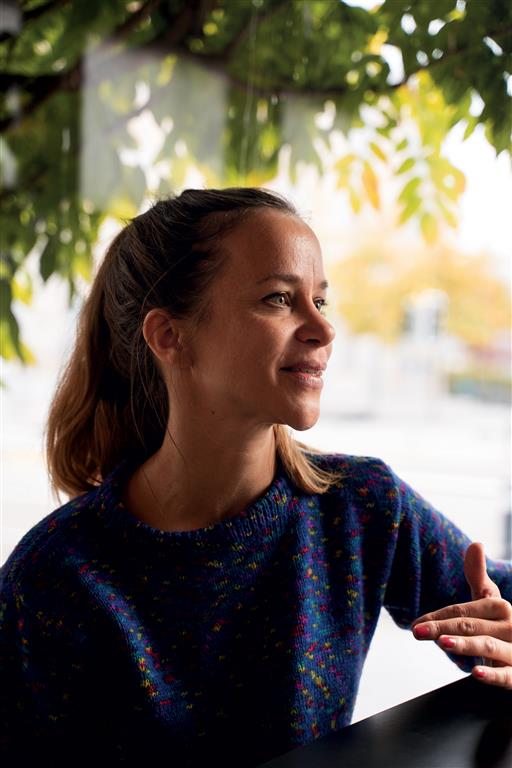Apps, wine and literature – the young generation of Swiss women creators
They are young, female and are making a name for themselves as the vision behind some innovative new projects and start-ups. More and more young women in Switzerland are breaking out of traditional roles and rejecting the limitations imposed by existing structures to give shape to their ideas. We meet three young Swiss creators.
Madelyne Meyer lets some fresh air into the wine cellar
With her blog, Madelyne Meyer set out to explain wine in an engaging and entertaining way to a non-expert audience. As Edvin, which stands for 'educating' and 'wine', she has gained even more of a following thanks to the publication last year of her book Endlich Wein Verstehen, which is already a bestseller in Switzerland. Edvin is synonymous with accessible knowledge, to allow everyone – women, men and especially young people – to finally feel at ease talking about wine.

You're breaking down boundaries and raising quite a bit of dust in a very traditional business. How do you measure up to all the oenologists and sommeliers?
I don't measure myself against them – I do my own thing. I’m a wine expert thanks to my training in California, Bordeaux and Switzerland. But the more I learn, the more I realise how much I've yet to learn. My mantra is 'you never stop learning', which strikes a chord with my readers. I don't talk down to them, and we have a laugh. I don't want to lose that just because I have more expertise. Here's a good example: when a sommelier talks about tannins, it's very long-winded and theoretical. They can tell you how tannins are present in the skins and in the seeds of the grapes and how they are released in the cask. When I want to explain tannins to my readers, I say that they are the substances in the wine that create that dryness in the mouth and that give the wine body. The theorists go much too far, whereas I stay at the customer's level and explain it in familiar terms.
Women and wine is also a recurrent theme on your blog. What do you hope to change?
In both the US and in France, I met some impressive women in the wine business. These meetings were an inspiration for me. On my blog I wanted to create a platform for the women and their wines, and tell their stories. In Bordeaux, many extremely competent women are coming to the fore in the wine-growing business, having taken over the family vineyards. I want to put them in the spotlight to show that women make good wine too. I also want to call into question the gendered language we use to talk about wine. It makes me uncomfortable that a fine, elegant wine should be feminine and a full-bodied, complex wine masculine. In Pomerol, a region known for its characterful wines, I met a petite woman making full-bodied, powerful wines – so it's not a self-evidence.
Actually, men don't know any more – or less – about wine than women. Women are just more reluctant to talk about it.

© Paolo De Caro / Junge Macherinnen, Édition De Caro
Marie Schneegans connects people at work
When Marie Schneegans got her first job she was excited, but it didn't take long for the initial euphoria to wear off. Feeling isolated and recognising only a few faces as a junior employee of a large company, Schneegans decided to develop a new app for colleagues to network more easily.

© Paolo De Caro / Junge Macherinnen, Édition De Caro
Let's talk about your apps Never Eat Alone and Workwell. You want to help colleagues get together for lunch. Why?
Never Eat Alone's mission is to help employees feel happier and more connected at work. For example, if you like tennis, you can use our app to find someone else who shares your hobby. The app matches people based on a shared need, regardless of their level in the hierarchy. We rolled out the app in over 100 companies and we always got the same feedback. The employees wanted to be able to order food easily, find a jogging partner or car-pool to work, and sometimes book a meeting room – all services related to their everyday work. That's why we combined the social aspect of Never Eat Alone with many other services in an open platform – Workwell – which is designed to help employees in big offices to connect better.
Why do you call yourself a creator? What is a creator?
I'm a creator because I created something from nothing – I made a finished product starting with nothing but an idea. At the beginning I had to do everything myself: find the right people, the right customers, put a team together. I face challenges every day and I have to make it work, which takes a lot of energy. But then to see it start to grow is really rewarding. My dream has become a reality. I think anyone can do it – anyone can be a creator. There are no age limits, you can start young or later in life.
If it didn't work out, I'd try it another way. It was hard work. For me, no never meant no.
Tabea Steiner reads and writes for a living
Tabea Steiner loves reading and writing and has succeeded in turning her two great passions into a career on the Swiss literary scene. Among her many roles, she has made a name for herself as an organiser of literary events, founder of the Thun Literature Festival and the creator of a reading festival. Her debut novel Balg has recently caused a stir. She is part of a generational shift taking place on the Swiss literary scene.

© Paolo De Caro / Junge Macherinnen, Édition De Caro
You know the Swiss literary scene really well. How would you describe the young generation of Swiss writers?
What strikes me is that women are getting more attention and there is a great solidarity between women writers at the moment. For a long time, that wasn't the case. There were always two or three individuals who were considered great writers, and then there were the rest. The women were mostly consigned to the second group. That's what Isolde Schaad has told me. She's a well-known author and journalist from Zurich. Much has changed in that respect. The Bieler Literaturinstitut has played an important part. The institute is producing graduates who say "I am a writer", even if they haven't yet written a book. It's a different kind of self-confidence. Among them are young people, and especially many more women, for whom writing is a self-evidence. There is a benevolent, solidary, matter-of-fact, almost friendly movement of women who are simply saying "we're here too". Perhaps I'm just noticing this now because I was recently doing some work on the statistics of literary awards. It's incredible how many more men receive awards from literary foundations. The website Frauenzählen.de has demonstrated that for one thing there are many more male critics and also that the authors of the books reviewed in newspapers are mostly men. Only a third of the books were written by women. So there's a lot of room for improvement.
What have you learned from all this creative activity?
When I started, I felt like culture was a pie that it's very difficult to get a slice of. That's not true at all. It just takes time. If you do serious work, people take you seriously. I've also found that it pays to be friendly. It sounds banal, but it's okay to be friendly. I wouldn't describe myself as someone who is very loud – I'm not good at elbowing. Sometimes I feel like I'm breaking into a male domain, because the whole world is still male dominated, and I have to defend myself. But that, too, is not really necessary. I've also learned to keep going. Rejection has never caused me to doubt my work, it has always spurred me on to do better. It's worth it in the end, but it takes time, and in that time you build up a network. I thought it would be difficult to become part of the scene, and now I'm suddenly at the centre of it.
A creator starts something without knowing how it will turn out.
The above are translated extracts from the book Junge Macherinnen. Interviews mit 12 Schweizerinnen, die neue Wege gehen by Rachele De Caro: https://edition-decaro.ch/jungemacherinnen/




